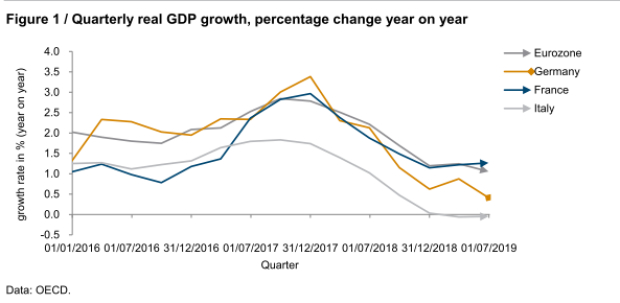The current economic downturn in Europe must be seen in the context of a wider problem of economic polarisation
30 September 2019
The 2017-2018 economic upswing only masked the underlying economic polarisation within the EU, which will again become more evident as the economy continues to cool.
The cyclical upswing in the EU in recent years led to widespread optimism. After years of recession, several European countries were finally able to record stronger economic growth and declining unemployment rates. Unfortunately, this temporary improvement in business cycle conditions has already come to an end, and a downswing has recently been gaining force (see Figure 1).
In a new study , we argue that it is to be expected that the underlying economic polarisation within the EU will again become more visible. At the analytical level, we not only document a process of multi-dimensional polarisation within the EU, but also link existing economic divergences with a central long-term problem, namely structural polarisation: differences in the institutional and legal embedding (e.g. in the areas of tax and corporate law, the labour market or the financial sector) and in technological capabilities are a major driver of divergence in living standards between some member states. This polarisation, which started even before the financial crisis but has intensified over the last ten years, is due largely to the global and the European ‘race for the best location’.
In this ‘race for the best location’ for international investors, some countries – such as Germany and Austria – succeed primarily because of their unique characteristics in the area of technological capabilities (which, for example, make it possible to produce machinery and industrial goods, for which there is high international demand), while other countries try to achieve success in international competition by creating particularly favourable institutional ‘location factors’, for example in the areas of corporate taxation (e.g. Ireland), labour market policy (Eastern Europe) or financial services (Luxembourg, the Netherlands, Cyprus and Malta). By contrast, other EU Member States, particularly in Southern Europe, can only compete to a limited extent in this contest for the best location, and are therefore gradually falling behind in terms of both international competitiveness and material living standards.
Without coordinated and cooperative intervention by economic policy-makers, a further drifting-apart of economic development paths seems unavoidable. The large differences in the production structures of the EU countries and the resulting highly unequal distribution of technological capabilities are self-reinforcing in nature, and will further intensify polarisation.
Our study provides proposals for a coherent European overall strategy that not only addresses existing problems and renders possible the often-promised upward convergence between EU countries, but also provides a potential basis for dealing with key future challenges (such as digitisation, ageing society, climate change or global trade) on the basis of common European objectives. The focus is on safeguarding and expanding European values and institutions, in order to deepen European integration at key points; and thus also to contribute, in the medium to long run, to a transformation of the global economic order from the European side. A central argument is that coordinated measures in various policy areas – especially in wage, monetary, fiscal and industrial policy – are of central importance in creating a long-term successful economic basis for the common European economic and monetary area.

